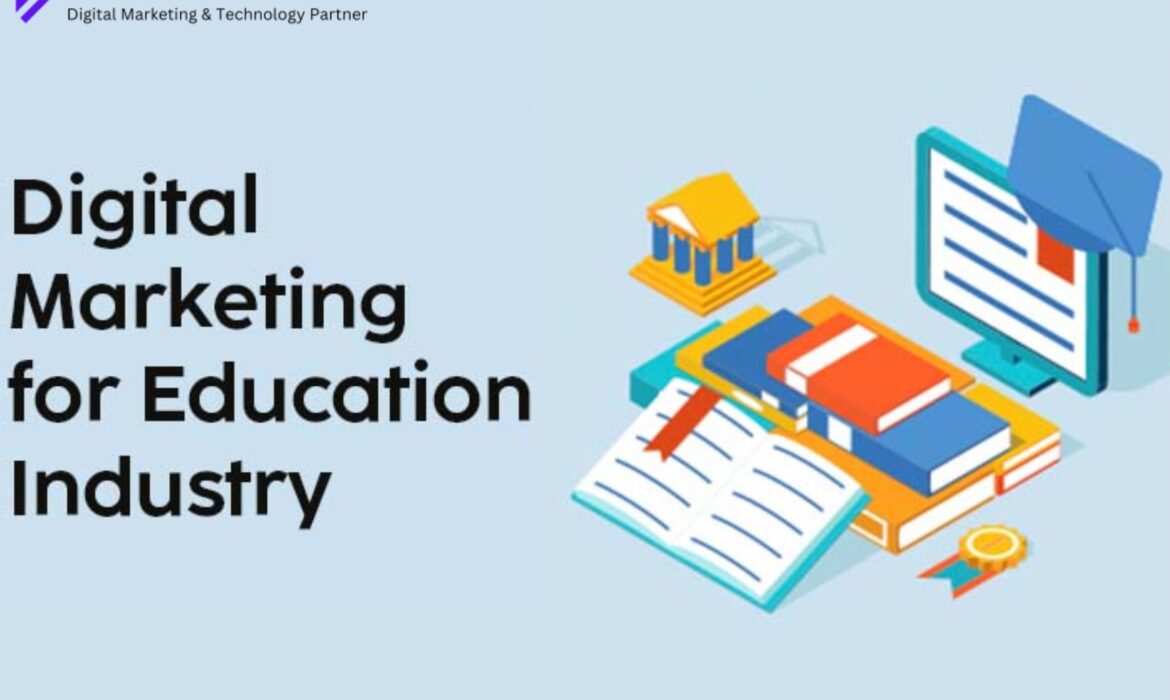+91-9625063767

Education marketing In the digital age, education marketing has become a crucial strategy for schools, colleges, universities, and online learning platforms. With increased competition and evolving student preferences, educational institutions must leverage digital marketing techniques to attract, engage, and retain students effectively. This guide explores education marketing strategies that drive enrollment, build brand awareness, and enhance student engagement.
Understanding Education Marketing
Education marketing refers to promoting educational institutions, courses, and programs to prospective students, parents, and stakeholders through various online and offline channels. It involves a mix of digital marketing, branding, and targeted campaigns to reach the right audience.
Why Is Education Marketing Important?
- Increased Competition: The rise of online learning platforms and global education opportunities has made it essential for institutions to stand out.
- Changing Student Behavior: Today’s students rely on digital platforms to research institutions and programs before making decisions.
- Brand Building: A strong online presence establishes credibility and attracts potential students.
- Higher Enrollment Rates: Effective marketing helps institutions connect with prospective students and guide them through the application process.
Top Education Marketing Strategies
1. Search Engine Optimization (SEO) for Higher Visibility
SEO is crucial for increasing an institution’s online presence and ensuring that it appears in search results when prospective students look for courses or universities.
Key SEO Strategies for Education Marketing:
- Keyword Optimization: Use relevant keywords like “best MBA programs,” “top engineering colleges,” and “online degree courses.”
- Content Marketing: Publish informative blog posts, guides, and case studies to attract organic traffic.
- Technical SEO: Ensure a fast-loading, mobile-friendly website with a seamless user experience.
- Local SEO: Optimize for location-based searches like “best colleges in New York” to attract local students.
2. Content Marketing for Student Engagement
Content marketing helps build credibility and engage students through valuable resources and insights.
Effective Content Types:
- Blog Posts & Articles: Cover topics like career prospects, admission tips, and campus life.
- Video Content: Virtual campus tours, student testimonials, and faculty interviews enhance engagement.
- Infographics & E-Books: Provide detailed information in visually appealing formats.
- Webinars & Live Q&A Sessions: Engage prospective students in real-time discussions.
3. Social Media Marketing for Student Outreach
Social media platforms play a vital role in connecting with students and promoting courses.
Best Practices for Social Media Marketing:
- Use Multiple Platforms: Target students on Instagram, Facebook, LinkedIn, Twitter, and YouTube.
- Engaging Posts: Share success stories, behind-the-scenes content, and student activities.
- Influencer Collaborations: Partner with student influencers or alumni to boost credibility.
- Paid Advertising: Use targeted ads to reach specific demographics and interests.
4. Pay-Per-Click (PPC) Advertising for Instant Results
PPC advertising allows institutions to attract students quickly through paid search ads.
Effective PPC Strategies:
- Google Ads & Bing Ads: Target relevant keywords with high conversion rates.
- Social Media Ads: Run ads on Facebook, Instagram, and LinkedIn to reach students.
- Remarketing Campaigns: Retarget students who visited your website but did not complete an application.
5. Email Marketing for Personalized Communication
Email marketing helps nurture prospective students through tailored communication.
Effective Email Strategies:
- Automated Drip Campaigns: Send a sequence of emails based on student interactions.
- Personalized Messaging: Address students by name and tailor content based on their interests.
- Event Reminders & Application Deadlines: Keep students informed about important dates.
6. Website Optimization for Better User Experience
A well-designed website enhances student engagement and conversions.
Key Features of an Optimized Website:
- Mobile-Friendly Design: Ensure seamless navigation on all devices.
- Clear Call-to-Action (CTA): Use buttons like “Apply Now” or “Request Information” for easy access.
- Live Chat & Chatbots: Provide instant assistance to prospective students.
- Fast Load Time: Optimize images and scripts for quick website performance.
7. Video Marketing for Higher Engagement
Video content is highly effective in education marketing, helping institutions showcase their culture and programs.
Types of Video Content:
- Campus Tours: Give students a virtual tour of your institution.
- Student Testimonials: Share real stories from alumni and current students.
- Course Explainers: Highlight key features of various programs.
- Live Streams & Q&A Sessions: Interact directly with potential students.
8. Online Reputation Management for Credibility
Maintaining a positive online reputation is crucial for building trust among prospective students.
Reputation Management Tips:
- Encourage Student Reviews: Ask students to leave feedback on Google, Facebook, and forums.
- Monitor & Respond to Feedback: Address negative reviews professionally and resolve issues.
- Showcase Testimonials & Achievements: Highlight awards, rankings, and success stories.
9. Influencer & Alumni Marketing for Trust-Building
Partnering with influencers and alumni helps increase credibility and reach.
How to Use Influencer & Alumni Marketing:
- Alumni Success Stories: Feature graduates who have excelled in their careers.
- Student Ambassadors: Engage current students as brand ambassadors.
- Collaborate with Industry Leaders: Work with professionals to endorse your programs.
10. Data Analytics & Performance Tracking for Continuous Improvement
Analyzing campaign performance ensures continuous optimization and better results.
Key Metrics to Track:
- Website Traffic & Bounce Rates: Monitor visitor behavior.
- Conversion Rates: Track inquiries, applications, and enrollments.
- Engagement Metrics: Measure likes, shares, and comments on social media.
- ROI on Ad Campaigns: Evaluate the effectiveness of paid advertising.
Future Trends in Education Marketing
- AI & Chatbots: Institutions are using AI-driven chatbots to assist prospective students.
- Voice Search Optimization: More students are using voice assistants for searches.
- Virtual Reality (VR) Campus Tours: Offering immersive experiences for remote students.
- Microlearning & Short-Form Content: Platforms like TikTok are influencing education content strategies.
Conclusion
Education marketing is evolving rapidly, and institutions must adapt to stay ahead. By leveraging SEO, content marketing, social media, PPC, and data analytics, schools and universities can attract, engage, and convert prospective students effectively. Whether you’re a college, university, or online learning platform, implementing these education marketing strategies will ensure long-term success in an increasingly competitive landscape.
Education marketing




